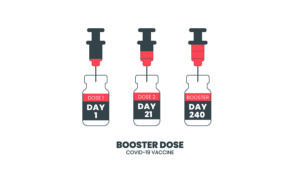The US CDC recently commented about booster vaccines and what it means to be fully vaccinated. Notably, three large studies from the US Centers for Disease Control and Prevention became available and were reviewed by CNN.
As an illustration, I am summarizing their findings below. It is important to realize that presently 99% of Covid infections are due to the Omicron variant. Indeed, all three studies emphasized the importance to have the booster shot for better protection from the Omicron variant.
First study
The following data was published in this study:
- Booster vaccines prevented 90% of hospitalizations from Omicron infections
- Full vaccination (two Pfizer shots 6 months apart) was only 57% effective
- There was an 82% effectiveness in boosted people to prevent visits to emergency rooms and urgent care centers
- Getting two shots was only 38% effective preventing visits to emergency rooms and urgent care centers
“I think we have to redefine fully vaccinated as three doses,” said Dr. William Schaffner. He is a long-time CDC vaccine adviser who had no involvement with the studies.
Second study
Based on data from 23 state and local health departments a second study was published. Specifically, it concluded that people who had three shots of the anti-Covid vaccine had a lot more protection from the Omicron variant. These are the findings:
- Boosted people had 149 Omicron cases per 100,000 people on average each week
- Those with only two vaccine doses had 255 cases per 100,000 people per week
Third study
A third study, published in the medical journal JAMA is based on 13,000 Omicron infections and its analysis. In particular, the researchers compared people who had only two vaccinations with those who had a booster vaccination. On the positive side, people after a booster vaccine were 66% less likely to get a symptomatic infection. On the negative side, the comparison was with people who had only two vaccinations. That is to say that all three studies found that unvaccinated people had the highest number of Covid infections, the highest complications and death rates.
What “fully vaccinated” means
It must be remembered that according to the present CDC rules you are fully vaccinated two weeks after the second vaccine (Pfizer or Moderna) or two weeks after the first dose of the Johnson & Johnson vaccine. The CDC recommends booster doses for everybody age 12 and older 5 months after the primary vaccine.
Statistics of compliance to vaccination recommendations:
- Less than 50% of those who qualify for booster shots got them
- Only about 25% of people in the US had a full vaccination and a booster vaccine
- Nearly 20% of the US population who are eligible to receive an anti-Covid vaccine (age 5 and older) have not received any vaccine. They are unvaccinated
Conclusion
It is sobering to see the statistics of who had a full vaccination in the US and who did not. The ones who are least likely to have a hospital admission are the ones who had their booster shot. But only 25% of the population had their booster shot, the others are more vulnerable to end up with Covid symptoms and/or end up in hospital. I have reviewed three large studies that are all based on recent investigations and involve several 100,000 people in the US. Scientists at the US Centers for Disease Control and Prevention (CDC) are considering to update their previous recommendation who should be considered “fully vaccinated”. “I think we have to redefine the term fully vaccinated as three doses,” said Dr. William Schaffner. He is a long-time CDC vaccine adviser who had no involvement with these studies.








Pingback: what will happen after Omicron